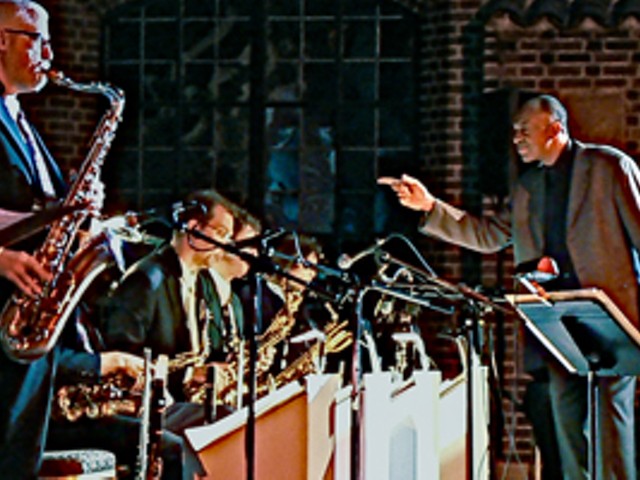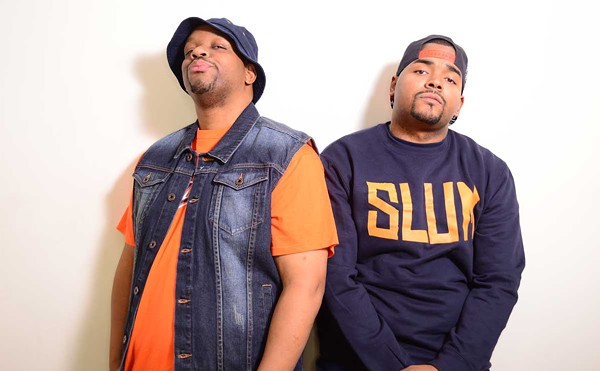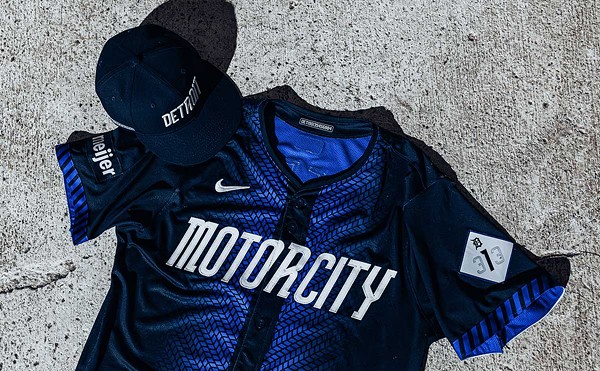Four years ago, Hush was on top of the world. He'd been on the season finale of the reality show The Contender. Nate Dogg was singing his hooks and Eminem was appearing in his videos. "Hush is coming …" the song said — and the Detroit rapper born Dan Carlisle was on his way. Or at least he should have been.
But then, as happens more often than it doesn't, things started heading south. What had so impressed the important folks at Geffen Records — the speed with which he could turn around tracks, his ability to bring rock-rap back from posturing clichés into a true hip-hop/rock hybrid not heard since Kid Rock's debut a decade ago, the fact that he'd survived so many false starts in Detroit as an Eminem also-ran to come this far — just couldn't head off the rap-rock backlash that, by 2006, accounted for Limp Bizkit's lowest-selling album. Well, that and the fact that Limp Bizkit sucked. Hush's Bulletproof didn't suck, though; it just never had a chance. When the album came out, according to Hush, Geffen made the record a label priority, with a marketing budget in place to sell 200,000 copies. Within months of the backlash, though, the support was gone. He'd be lucky if it sold 20,000.
Now as much as Hush could have blamed the fact the music industry's expensive earth-mover of a machine simply commanded a smaller piece of marketplace real estate, that's not exactly how it went down. Before Hush got his Geffen deal, he explains carefully, he had an investor bankrolling the studio time it took to get him his deal. And when the Geffen deal withered, Hush got what's often known as "buyer's remorse." The Hummer and Indian were both in the investor's name. Hush started getting calls claiming a tow truck was in his driveway. "And there was nothing I could do about it," he says glumly.
Then things went from bad to worse. His son's mother, unbeknownst to Hush, had been diagnosed with cancer while pregnant with their second child but didn't tell him until it was too late. "They'd told her if she got treated for the cancer she'd risk losing the baby," he says. The couple had actually parted amicably at the time and Hush was engaged with a third son on the way when he found out his former girlfriend was fatally ill.
Within two years, he'd gone from Detroit hip-hop's other "white meat" to an unemployed, grieving father of three with a family and a mortgage. Welcome to Detroit! He parted ways with his band and manager. Hard up for cash, he took a job working the night shift at a factory that was an hour-plus drive away. He'd get home and during the hours before his sons got up for school, he'd make music. Not for a single, not even — at the time — for an album, but just to do what he needed so he could get it the fuck out.
The songs, owing to their pre-dawn arrival perhaps, took on an ominous, sometimes epiphanous urgency. "No Love," built on a big loop of the White Stripes' "The Death Letter" is a brutal and bitter breakup that's reduced to a one-night-stand again. Back in 2002, Hush had written "Poetic Justice" over a Moby track and it was used for the conclusion of Michael Mann's Heat film. And now he was sort of writing his own finale montage tracks — delicate, anthemic keys, building drums, rope-y, propulsive riff that take flight with the (finally) full-lunged choruses of R&B rapper Cadillac Dale.
"Rise Again." "The Open Book." The titles speak for themselves. But just in case they didn't, Detroit-born, L.A.-based, Sundance Lab-mentored filmmaker Daniel Casey directed some what-you-see-is-what-you-get videos for the tracks. "The Open Book" one even has Hush sweeping up in a liquor store — not too far from his actual night job. "I'm never at a loss for words," the rap begins, "Sometimes I get troubled and stop and readjust my nerves/Sometimes I'm just too honest/Lie to myself about where I'm headed but I promise one day, it'll make sense." Especially on this track, he has the kind of weary confidence that's as much Morgan Freeman's parole board speech in The Shawshank Redemption as it is Tupac on "Dear Momma" — pained, yes, but with an exit strategy. Even if that's just him saying "fuggit." If Bulletproof was all about succeeding, then Open Book is just about surviving. "The difference is that I was writing as this rapper [persona] back then," he says. "Now it's me. This is my life. This is everything that got me to where I am right now."
And where Hush is right now as this interview takes place is Hollywood — again. "I'm stressed," he says flatly in the mall-lobby outside that city's Knitting Factory, where he's helping his drummer wrangle a rack tom only minutes before he and his band will hit the stage to showcase his new material. He greets everyone as they're coming into the venue. Mostly, it turns out, he's greeting the TV folks — the same ones who put his dramatic end-credit rap into reality shows like The Contender and the upcoming Crash Course, filmed on Belle Isle. (The show premiered on ABC-TV on Aug. 12.)
Drama certainly seems to find Hush when he's in L.A. On his last trip out in April, within four hours of landing, he'd had an offer to appear in episodes of 24 that were scheduled to be filmed in Detroit … only to return to his rental car to find its window busted and the GPS stolen. This time, his drummer Paul Cramer's head's been split open from a freak accident that happened while loading gear for rehearsal a day before.
Nevertheless, at 9 p.m. sharp (L.A. showcases are soullessly punctual, and early) Hush's band — bassist Craig "Spider" White, guitarist Cyamak Ashtiani, rapper Dale, guitarist Kyle Palermino, keyboardist Aaron Berch and Cramer — not so much dive in but land cannonballs to begin the set. It's maximalist metal hip hop — the riffs scattered, gnarled, winding — but Hush bobs and weaves in and out of the mix and Dale allows the choruses to breathe and shine. Four songs in, Dale says something about a mashup and Hush announces, "This next song is called 'Baba O'Riley.'"
What starts as a hip-hop interpretation of the Who becomes the highlight of the night — maybe of this year — when Dale starts singing, "Out here in the fields …" and the band proceeds (after 20 minutes of riffs hard to hold down to an actual hook) to land an FM staple. (Dale will later admit he had no history with the Who song.) It's a performance that's hard to top, but Hush and the band then do just that on the "99 Problems"-ish "Scared Money." A few songs later, the showcase ends, Hush has a beer and everyone heads to the afterparty at the Hollywood tattoo shop Ink Candy, where tomorrow, the band will all get their matching H's. And, of course (it being Los Angeles and all), Hush's tooth will, ominously, begin to hurt.
In all, though, the performance seemed less like a label showcase than it did a thank-you note to supporters and the music supervisors Hush has been working with on Crash Course. There's now a deal from an East Coast label that's really to get The Open Book out there, he says. But he's in no hurry.
"I hear [emcees] in Detroit complaining that there's no audience for local hip hop, but I'm selling 500 tickets," Hush boasts. And the Detroit hip-hop scene still respects the effort.
"Hush has always been the kind of guy you see around and wonder, 'What the hell is this guy doing?'" says local rapper Quest McCody. "Next thing you know, you see a 20-foot banner with his face on it, hanging from a building in downtown Detroit. Even if you hate him, you can't say he doesn't know how to brand himself."
"With what's happened in the industry during the last three years," Hush theorizes, "I'm in the same place as a lot of people who still have [major record] deals. ... "
Hush has worked with more conventional hip-hop names (Chino XL, etc.), certainly, but Open Book is (once again) more "end-credit montage" style hip-hop, with riffs and deep verses. But it can also sound like the kind of metal you might hear at Guitar Center on a Saturday afternoon, sometimes anachronistically so. But, then again, coming from a city with the time and inclination to actually give it a listen on a long gray Sunday afternoon rather than party to it on a Friday night, Hush — the man and the band — have never sounded, for better or worse, more perfect.
Back in 1998, Kid Rock — himself riding the rap-rock wave — said that rock was "gonna come back in a big way." At the time, it sounded like he may as well have been talking about parachute pants. So who knows? The Hummer and Indian may not have been forever. But those tattooed H's on his bandmates' arms ...
For better or, as he well knows, for worse, Hush just keeps coming.
Freelancer writer Hobey Echlin thinks there should a kind of Hush all over the world. Send comments to [email protected]




